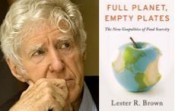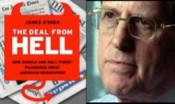Q&A: LESTER BROWN – FULL PLANET, EMPTY PLATES
Written on December 25th, 2014 |
Aired: 12/23/12
Recorded: 10/17/12
When gas prices were at or near record highs a few months ago in the US, that got people’s attention. What about food prices? Have you noticed them rising? Are you making different choices in the supermarket? If not, it might be because of two things.
One, in America so much of our food is processed, packaged and marketed, that raw commodity prices make up only a fraction of the price of the food we buy. In other countries, especially the less developed ones, an increase in the price of rice or corn can have a major effect on how much a family can afford to eat. Two, Americans spend only 9% percent of their income on food, while millions around the world spend 50-70%. Millions of households now routinely schedule foodless days each week-days when they will not eat at all. A recent survey by Save the Children shows that 14% of families in Peru now have foodless days. India, 24%. Nigeria, 27%.
In his newest book, FULL PLANET, EMPTY PLATES, LESTER BROWN writes,
“The U.S. Great Drought of 2012 has raised corn prices to the highest level in history. The world price of food, which has already doubled over the last decade, is slated to climb higher, ushering in a new wave of food unrest. This year’s corn crop shortfall will accelerate the transition from the era of abundance and surpluses to an era of chronic scarcity. As food prices climb, the worldwide competition for control of land and water is intensifying. In this new world, access to food is replacing access to oil as an overriding concern of governments. Food is the new oil, land is the new gold. Welcome to the new geopolitics of food.”
www.earth-policy.org
Q&A: JAMES O’SHEA, former editor-in-chief of the Los Angeles Times, author – THE DEAL FROM HELL
Written on November 23rd, 2011 |
11/20/11
This week’s show is about a Los Angeles institution and source of local pride, nurtured to greatness as a family-owned business, purchased by someone from out-of-town who knew little about the business, put up little of his own money, and ran the property into the ground so that it is now a shell of its former self. And many customers have reacted by not buying the product.
No, we’re not talking about the Dodgers, but the Los Angeles Times.
After buying Times Mirror, The Tribune Company sent JAMES O’SHEA to LA to run the Times. Sam Zell bought the Tribune Company in a deal that even I – no financial expert – thought was both bad and doomed, and soon the Tribune Company was in bankruptcy where it remains.
O’Shea refused to do his bosses’ bidding in terms of cutbacks and he was let go. Over the next two years the Times cut nearly 40% of its journalists. JAMES O’SHEA has since founded a Chicago news cooperative of which he is editor, attempting a new model of journalism.
JAMES O’SHEA is editor and co-founder of the Chicago News Cooperative, former editor-in-chief of the Los Angeles Times and past managing editor of the Chicago Tribune. Under his leadership, the Tribune’s news staff received six Pulitzer prizes. O’Shea is the author of THE DAISY CHAIN about the savings-and-loan crisis of the 1980s, DANGEROUS COMPANY, an examination of management consultants’ role in corporate decision making, and his latest THE DEAL FROM HELL: How Moguls and Wall Street Plundered Great American Newspapers.
http://www.chicagonewscoop.org/
